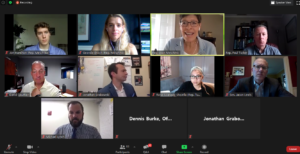(BOSTON) – Last week, legislators, advocates, and Massachusetts residents attended a legislative briefing for H.130/S.2200, An Act relative to a streaming entertainment operator’s use of the public rights-of-way/An Act relative to digital entertainment on public rights of way, jointly filed in the House by Representatives Joan Meschino (D-Hull) and Paul Tucker (D-Salem) and in the Senate by Senator Jason M. Lewis (D-Winchester). The bill would use funding from a new fee to support community media.
In the 3rd Plymouth District, our community media centers are vibrant hubs of connectivity. In addition to covering news and providing trainings for residents interested in media, our media centers offer opportunities for public engagement and chances to learn about arts, culture, and history. During the pandemic, community media was critical to our efforts to stay connected and informed on the local level, and our centers continue to do great work as we emerge from the public health crisis. Learn more about our local media centers and MassAccess, the collective that advocates for their interests, here:
For decades, community media has thrived in Massachusetts thanks to federally-mandated franchise license agreements, in which cable companies agree to remit up to 5% of their gross annual revenue back to the city or town in which they do business, to support local community programming. However, cable alternatives such as streaming entertainment, which is most often delivered via the same infrastructure, are not subject to those same requirements. In other words, streaming providers rely on local infrastructure to sell their product to millions of Massachusetts residents, yet pay nothing to use that infrastructure.
An Act relative to a streaming entertainment operator’s use of the public rights-of-way seeks to align the successful franchise fee system with the current era of digital streaming, modernizing the obligations to entertainment providers who are using public rights of way (telephone poles, conduits, sidewalks, etc.) to deliver their product.
Following the model of cable franchises, the bill would impose a 5% fee on digital streaming providers which are using public rights of way in order to sell their services to Massachusetts residents. Monies would be collected at the state level twice a year and then distributed to the community media centers, to the municipalities and to the state general fund. The money would be distributed based on population and shared via existing distribution methods. It is important to note that this bill is not a tax on the internet, nor is it a tax on Massachusetts residents. Were Massachusetts to enact this legislation, the state would be following in the footsteps of many others which have already imposed a similar fee on streaming services, including Florida, Iowa, Minnesota, Nebraska, North Carolina, Ohio, Pennsylvania, South Dakota, and Washington.
“Our bill meets an urgent need to support the community media centers that are a trusted source of local reporting and have been so instrumental in connecting and informing our communities prior to and throughout the pandemic,” said Representative Joan Meschino (D-Hull). “Our community media centers offer vibrant, robust programming that deserves to be supported by sustainable revenue that would flow from this legislation.”
“The pandemic clearly demonstrated that our community media centers play a key role in promoting and enabling civic engagement, but they will not be able to meet the increased demand for their services without renewed acknowledgement and support,” said Senator Jason Lewis, the lead Senate sponsor of the legislation. “I’m grateful to MassAccess and my House co-sponsors Representative Meschino and Representative Tucker for their leadership as we advocate for this legislation and work to ensure that community media centers remain a strong part of our local civic ecosystems.”
At the briefing, Representative Meschino, Representative Tucker and Senator Lewis introduced the legislation by emphasizing the value of our community media centers and urged fellow legislators to consider co-sponsoring the bill. MassAccess representatives provided context for the bill and shared a video showing community members speaking about the benefits they have received from their community media centers that underscored the legislation’s value. These benefits include community media centers’ unique ability to share a wealth of reliable local news, particularly throughout the pandemic, as well as centers’ involvement in inspiring and training young people in media. The video can be found at this link.
The bill received broad support from local media centers, advocates, and legislators at the briefing.
The House bill is assigned to the Joint Committee on Advanced Information Technology, the Internet and Cybersecurity and the Senate bill is with the Joint Committee on Telecommunications, Utilities and Energy. We are waiting for a hearing to be scheduled.
